If you keep your own flock of chickens, you already know how beneficial these little workers can be. They provide eggs, gardening help, pest control, and eventually a rich chicken stock or Sunday dinner.
But these birds have more to offer in the way of resources than most people realize. One of the overlooked and invaluable byproducts hens produce is their eggshells.
Surprising Uses for Eggshells
Usually, eggshells get discarded immediately after they’re used. But why throw them out when you can use them to make life easier on the homestead or garden?
Eggshells are one of nature’s most calcium-rich foods and contain high phosphorus and magnesium levels.
They also have traces of sodium, potassium, zinc, manganese, iron, and copper — all of which are essential elements you want in your body and in your garden.
Related: 8 Cheap Protein Sources to Add to Your Stockpile Right Now
Are Eggshells Safe to Use?
The single-most thing that seems to hold people back from using eggshells these days is the risk of salmonella. Even though the risk of becoming ill from eating eggs is extremely rare, it’s still understandable why some people are hesitant.
This is especially true for people who don’t have hens of their own and depend on store-bought eggs.
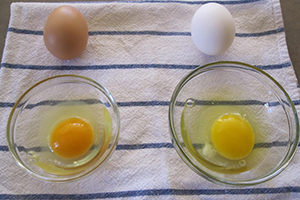
When folks buy store-bought eggs, they don’t know for certain what conditions the hens are living in.
Usually, the hens that are used for mass egg production are known to produce eggs that are significantly lower in nutrients.
However, with proper cleaning and storage techniques like buying eggs from a neighbor, raising hens yourself, or buying from a reputable source, you can eliminate the risk of this rare sickness altogether.
How to Prepare and Store Eggshells
Unless you have eggs that are covered in dirt, feathers, or droppings—thoroughly cleaning them isn’t really necessary.
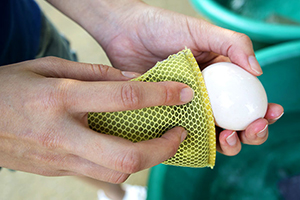 If you need to wash your eggs, a quick rinse in warm water or a wipe down with a damp washcloth will do.
If you need to wash your eggs, a quick rinse in warm water or a wipe down with a damp washcloth will do.
When you use eggs, instead of tossing the shell in the trash — lightly crush them and toss them into a jar.
When your jar is full, it’s time to prepare your shells.
To Prepare Your Eggshells, You Will Need:
- An oven or solar oven that can reach temperatures of 200 degrees Fahrenheit.
- A mortar and pestle, rolling pin, or whatever tool you have on hand to crush the shells.
- A mason jar or another strong storage container to keep your shells for future use.
Instructions:
1. Preheat oven to 200 degrees Fahrenheit.
2. Spread lightly crushed eggshells on a flat cooking surface like a baking sheet and bake for 10-15 minutes or until shells become very brittle. This will kill any bacteria that might linger on the shells.
3. Remove from oven and wait until shells have cooled.
4. Crush shells as finely as you’d like for your desired purpose, and store them in jars or storage containers until you’re ready to use them.
That’s all there is to it!
Unique Ways to Prepare and Use Eggshells
-
Calcium Supplement for Your Dog
On the homestead or SHTF situation, there are many reasons to keep dogs.
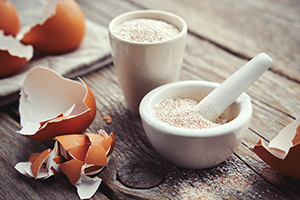
Whether your pup is a watchdog, companion, or hunter—it’s important to keep them in good health.
Finely ground eggshells added to dog chow are a perfect way to strengthen bones and teeth to keep your dog fit and healthy.
DIY calcium supplements for your dogs can save you a lot of money in the long run and will ensure your dog stays in great health.
Related: How To Make Calcium Supplements from Eggshells
-
Repel Pests from Your Garden
Nothing is worse than having your crop destroyed by pests.
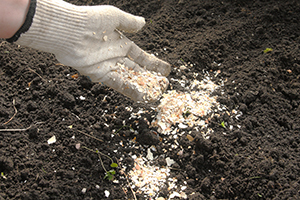
Sprinkling crushed shells around your garden beds or rows will keep the critters at bay. This is effective for cutworms, snails, slugs, and even works to repel cats and deer!
To repel pests from your garden with eggshells, lightly crush and sprinkle them around your garden beds or rows.
-
DIY Seed Starter
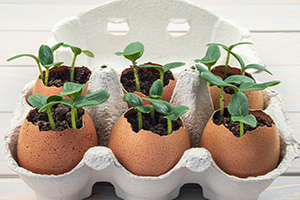 When you start your seeds in eggshells, you’re giving your seedlings an extra dose of calcium early in their lifecycle.
When you start your seeds in eggshells, you’re giving your seedlings an extra dose of calcium early in their lifecycle.
This can help these vulnerable little plants to develop resistance against common pests and diseases as they grow.
Best of all, the eggshells are biodegradable and will help to enrich the surrounding soil as they break down.
To make an eggshell seed starter, simply break an egg in half and use the shells as seed starters or seedling planters the way you would with peat pots or starter containers.
-
Calcium Boosting Chicken Feed
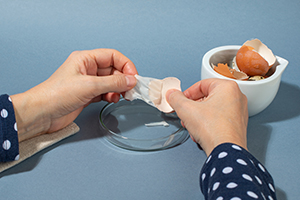
Did you know hens are known to eat their own eggs and shells in the wild?
Hens love it, but roosters are known to reject the opportunity to feast on the crushed shells.
Serving the shells back to the hens adds a powerful boost of calcium to their diet and results in stronger, healthier eggs.
This is a completely free source of nutrients for your hens and is just as healthy, if not more so, than store-bought calcium powder or oyster shells.
-
DIY Soil Amendment
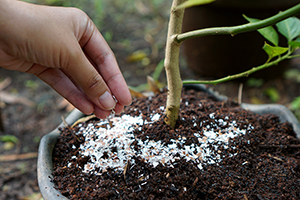 Instead of using harsh chemicals in your garden, you can feed your indoor and outdoor plants eggshells.
Instead of using harsh chemicals in your garden, you can feed your indoor and outdoor plants eggshells.
Using shells as a soil amendment and fertilizer reduces the chance of root and blossom rot and improves your soil. This method is especially effective with tomato and pepper plants.
Related: Bury An Egg In Your Garden Soil, What Happens Few Days Later Will Surprise You
-
DIY Calcium Powder
Getting adequate calcium is essential when living off-grid. When milk or other calcium-rich foods are not available, you need to have a plan B to make sure you get all the nutrients you need to survive.
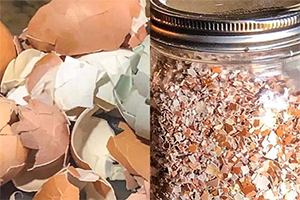
Without adequate calcium intake, your body will actually start to draw from the supply it needs from the minerals in your bones and teeth!
You can mix up a DIY “calcium shot” from finely ground eggshells added to water. Add honey for extra flavor and a vitamin C boost.
Calcium powder not only works as an emergency calcium supplement, but it also helps to settle stomach pains and diarrhea in humans as well as animals and livestock.
-
Compost Additive
Adding shells to your compost pile not only adds calcium to your final product, but also adds potassium, phosphorus, and magnesium too!
When your compost is ready to use, your NPK levels will be balanced and your plants will likely become more pest-resistant due to the high calcium levels present in the soil mix.
Waste Not, Want Not
The many uses of eggshells lend truth to the old expression, “one man’s trash is another man’s treasure.”
So, the next time you make your morning omelet or fry up some bacon and eggs, don’t forget to save those shells!
You may also like:
17 Forgotten Preservation Hacks that Will Save You Money
Why You Should Put Egg Whites On Second-Degree Burns (Video)
Frugal Prepping: How to Get Cheap and Reliable Ammo For SHTF

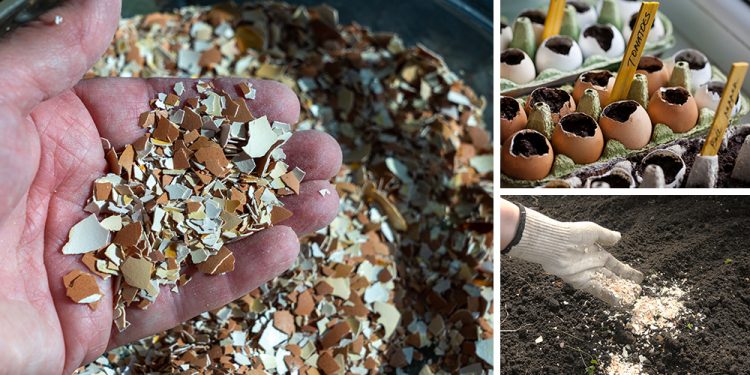
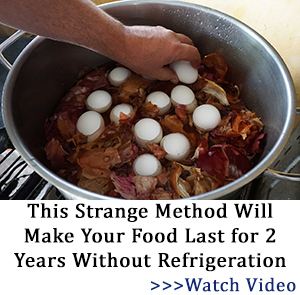













I used egg shells back in the 70s for my chickens! also I heard that putting egg shells in compost was not the best thing to do as it takes for ever for them to break down!?? Thoughts on that. But they are good for keeping your garbage disposer blades sharp!??
Just powder them in a blender first. You can also mix the powder into your potting or garden soil as a soil amendment which I’ve had great results with.
How useful! I will start saving eggshells (separately) right away. I already throw them into compost, but I am eager to try sprinkling powdered shells around my tomatoes.
I save and crush egg shells to put around my strawberries, it seems to help keep the slugs away from the berries. This is very helpful, indeed.
Here in the big city, I can’t raise chickens. They neighbors would complain. So, I purchase eggs with care. I look for jumbo organic chicken eggs or duck eggs in my local market. I put the cracked eggs shells directly into the garden. In no time, they dry out and demolish into tiny teeny pieces when you step on them. Always a hit around Easter with the kids to see that some of the eggs the bunny left in the garden hatched!
You know your stuff! Where I live, we have too much calcium and enough phosphorus for the garden. Shells go in the compost bucket, but do not breakdown in the compost. In PA and Ohio, my sisters don’t have that problem because they have plenty of nightcrawlers which use the shells as grit. their rain tends to be mildly acidic, as well.
After ours leaves the barrel, it goes into 5 gallon buckets (soon a 25 gallon tub) and red worms. They finish breaking it down to garden gold. Why not just put worms in the barrel? Red ants, birds (who take away a lot of insect pests), mites, 110 F weather, millipedes that can get 6 inches long. niio
Well, I don’t keep chickens, probably eat about 2 dozen eggs a year, what do I care about eggshells. The fella that runs this site, Claude, catches his share of grief for various reasons, but he keeps this a unique place. Lot of prepper sites are all fire and brimstone with everybody arming up, training in Krav Maga, debating the deadliness of the various blades. Here it’s supplements, knots, food storage. People are free to go off in any direction, but it’s hard to get a discussion fired up about the WTO, NWO, U.N. and etc…when the article is eggshells. And what to do with eggshells is of very little importance right now, but if one is really preparing for hard times all these little articles are great. There are some true Master and Mistress gardeners who comment here, I am a casual gardener, and a lot of people have never turned a spoonful of soil but hope to survive a difficult future off what they grow. I lost most of my garden this year, late cold and rain then early heat, boom, no garden to supplement my survival. Calcium from eggshells in your garden, a lot of little things to be learned from this site and its calm little articles that add up to big info. Shoot, just dumping your urine in a well managed compost pile can be a vital part of adding to your food supply. And comments are gold here, old poops like Govtgirl and Red have lived amazing lives and know things most people can’t imagine. Wish LCC would come back, I bet he looks at the site from time to time, maybe we need a petition!
JH – They’re all planning for Armageddon. Folks here are planning for survival. I’m with you in hoping LC comes back. You know, comment sections on websites such as this are for comments, and most have size limits because data storage is expensive. In the interim, I hope LC and his wife are doing OK. It’s not like Marines to give up! He’ll be back!
Marines are just angry crayon eating navy drop outs
Wow … what a comment. Remember that this is Claude’s site. He can do with it what he wants! If you want to see a site that is more about your interests, and fears …. it’s actually pretty simple to get a web site going … or even a Youtube page, to get people fired up. This site, has valuable information for those who hope to be around after the SHTF … survive-ability has importance, but what good is surviving the Sh*t … if you can’t survive with what is left. Claude is giving some insight as to how to prepare for the end game … after the SHTF.
JH is being cool. We all know Claude is the brains here. And, we don’t thank him often enough Claude, THANK YOU!. I very sincerely mean that.
Prayers are going up for LCC and his wife. LCC, if you see this, remember, you and that lady will always have a home here. niio!
To make the calcium in eggshells bioavailable quickly, add some vinegar to clean and pulverized shells. They will break down in a chemical reaction. Just drain the liquid off of the remnants. It is very powerful stuff. I use maybe a teaspoon per plant diluted in a cup of water.
Which one the remnants or the liquid?
I for one, really appreciate Claude and all of his posts. They are always informative and are full of information one can use day to day. Our forefathers generally knew most of these things but in this “”modern day” world we all live in, most of it has been lost. I regret taking for granted so many things my parents did when I was a young child. I did not pay attention and thus have had to re-learn almost everything.
I stumbled upon this website a few months ago and have really enjoyed reading the articles and comments, sometimes I gain more knowledge from the comments than the actual articles. I recently purchased my first home and between work and renovations I only cleared enough space for some tomatoes, peppers, cucumbers, broccoli, and greenbeans. Next season I will concentrate on expanding and diversifying my garden. I’m excited about finally having enough space to up my prepping supplies. (Hard when you live in an apartment, hard but not impossible.) Thanks to everyone who comments, whether you know it or not there are many of us who read them and never comment ourselves.
The articles on this site are usable for those of all income levels. Details, such as not wasting a good calcium source as eggshells, is always useful. I appreciate that the instructions on all the articles are so detailed and don’t assume that the reader can read between the lines.
I don’t get as involved as most with my eggshells as some on here have mentioned. As I use them in cooking, I rinse them out and put on the back of the counter to dry. When I go out in the garden, I nest the shells inside each other and then use my hands to crumble them under a plant.
Lin: If we need calcium, we can dig it by the ton out of the garden 🙂 Eggshells do not go to waste, tho. Dried and crushed well, earthworms in the beds eat them for grit. One thing I’ve been meaning to try them on is sowbugs. But, calcium and high in phosphorus, eggshells get high marks. niio
Dandylion Greene
Acetic acid, vinegar, is a de-calcifier. When you save what is left after dissolving egg shells in vinegar you have minimal calcium. The amniotic sac is about all that is left, not much calcium. The vinegar you pour off is probably more beneficial than the dregs.
Such a good idea for dogs and their joints! I will be giving that a try for sure!
Something I had thought about, egg shells for my composting pile. I live a city were we can apply for a permit and raise chicken for egg production but never have, my loss. My wife and I do eat a lot of eggs though and have always thrown away the shells. Thanks to your article here, I will be using them now. They have so many uses I did not know about, another tool, thanks.
Egg shells also can be made into toothpaste – helping to re-mineralize them
Another use for eggshells. Natures bandaid.
Inside a fresh egg is an air pocket. Crack the egg on the edge of the air pocket. Clean dry hand under the pocket (which is dry) Lift it in a large piece, the wet side is protein. Wet side down on the wound. Took a 1/2-3/4″ out of the heel of my hand. used the egg membrane. The outer edge of the wound healed very quickly WITHOUT INFECTION. Total closure was about a month.
Couple points, really fresh eggs, let the shell sit before using the membrane. also early on I let the layers build up, formed a decent “scab”
I add the eggshells to the bones when I make bone broth; I figure we can use the extra calcium. I will try to remember them for planting seedlings, too
I know this may sound weird at first and is not related to the eggshell article, rather gardening, but I grew up on a dairy farm my whole life and have been a country boy forever, 70 years. At any rate don’t waste resources has been our motto as we were poor and used everything.
Two valuable things are fertilizer and keeping critters out of your garden. First urine is collected each time you pee, easier for men. Then it is used on the garden. Most plants handle this without a problem, especially if not applied directly, then watch your plants flourish. This is especially good for things like watermelons, squash etc. Secondly, used toilet paper put in plastic bags and let to hang and flutter in the air are effective at keeping critters away. This is especially effective for ungulates like deer. Critters hate the movement, and the smell of humans are offensive to most animals. You will not be bothered by it as the paper dries quickly in the sun, yet still gives off an odor sensed by animals with a keen sense of smell.
Any idea how much powdered eggshell to supplement for humans or dogs?
Would it be a tspn?
Great read Thank you